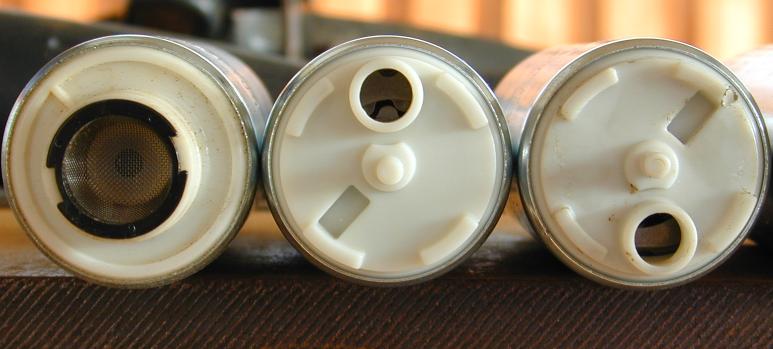Walbro In-tank Fuel Pump Specs
Walbro has been making OEM pumps and aftermarket pumps for many years. A few years ago, they added in-tank high pressure pumps for fuel injected vehicles to their aftermarket line. Their two most popular aftermarket in-tank high performance pumps are their 190 ltr/hr pump and their 255 ltr/hr pump.
Their first FI pump was a 190 ltr/hr pump. It was created for the Mustang. It also fit in the Turbo Regals quite well. They recently created a modified version of the 190 ltr/hr pump so it can fit in many other pump hanger brackets (e.g. Probe, Miata, etc.). With a 12 volt power source, these pumps flow 190 ltr/hr at 0 psi, 155 ltr/hr at 40 psi.
Later, they created a 255 ltr/hr pump This pump has the same fittings as the original 190 ltr/hr pump. They later created another 255 ltr/hr pump to match the fittings of the Probe pump. Later, they discovered if the output fittings of the Probe pump were turned 180 degrees, that the pump would fit some other applications (RX-7, 1st-Gen DSM), hence a third 255 ltr/hr pump was born. These pumps flow 255 ltr/hr at 40 psi, and 285 ltr/hr at 0 psi.

Then, they put a different pressure-relief
spring in a standard 255 ltr/hr pump. That raised the
output of the pump above 50 psi of fuel pressure. Walbro
builds all three versions of the original 255 ltr/hr pump in
"high pressure" versions. Below is a table that
compares the average flows of several pumps with a 12 volt
source.
Fuel pump flow rates and current draw at 12 volts
| Pressure (psi) |
190 ltr/hr fuel pump (gal/hr) |
190 ltr/hr fuel pump (amps) |
"high pressure" 190 ltr/hr pump (gal/hr) |
"high pressure" 190 ltr/hr pump (amps) |
255 ltr/hr fuel pump (gal/hr) |
255 ltr/hr fuel pump (amps) |
"high pressure" 255 ltr/hr pump (gal/hr) |
"high pressure" 255 ltr/hr pump (amps) |
|---|---|---|---|---|---|---|---|---|
| 0 | 56 | 2.6 | 53 | 2.8 | 75 | 4.7 | 76 | 4.4 |
| 10 | 52 | 3.2 | 50 | 3.5 | 72 | 5.2 | 73 | 4.8 |
| 20 | 48 | 4.0 | 48 | 4.3 | 67 | 6.1 | 68 | 5.5 |
| 30 | 44 | 4.8 | 44 | 5.0 | 62 | 7.2 | 63 | 6.3 |
| 40 | 40 | 5.7 | 41 | 5.9 | 58 | 8.2 | 59 | 7.1 |
| 50 | 36 | 6.6 | 38 | 6.8 | 53 | 9.3 | 54 | 8.0 |
| 60 | 32 | 7.6 | 35 | 7.8 | 49 | 10.6 | 51 | 8.9 |
| 70 | 28 | 8.6 | 31 | 8.8 | 40 | 11.8 | 46 | 9.9 |
| 80 | 22 | 9.7 | 29 | 9.9 | 29 | 13.3 | 41 | 11.0 |
| 90 | 12 | 10.8 | 25 | 10.9 | 0 | 14.6 | 32 | 12.0 |
| 100 | 0 | 12.5 | 21 | 12.0 | 22 | 13.2 | ||
| 110 | 17 | 13.5 | 11 | 14.5 | ||||
| 120 | 11 | 15.0 | 1 | 15.8 |
Fuel pump flow rate and current draw at 13.5 volts
| Pressure (psi) |
190 ltr/hr fuel pump (gal/hr) |
190 ltr/hr fuel pump (amps) |
"high pressure" 190 ltr/hr pump (gal/hr) |
"high pressure" 190 ltr/hr pump (amps) |
255 ltr/hr fuel pump (gal/hr) |
255 ltr/hr fuel pump (amps) |
"high pressure" 255 ltr/hr pump (gal/hr) |
"high pressure" 255 ltr/hr pump (amps) |
|---|---|---|---|---|---|---|---|---|
| 0 | 63 | 3.1 | 60 | 3.3 | 82 | 5.2 | 85 | 5.0 |
| 10 | 61 | 3.5 | 58 | 3.9 | 81 | 5.9 | 82 | 5.2 |
| 20 | 57 | 4.2 | 56 | 4.5 | 76 | 6.5 | 79 | 6.0 |
| 30 | 52 | 5.0 | 52 | 5.3 | 71 | 7.8 | 73 | 6.8 |
| 40 | 49 | 5.8 | 50 | 6.2 | 68 | 8.6 | 70 | 7.5 |
| 50 | 46 | 6.6 | 47 | 7.2 | 62 | 9.8 | 65 | 8.2 |
| 60 | 42 | 7.5 | 45 | 8.0 | 58 | 10.8 | 61 | 9.1 |
| 70 | 38 | 8.4 | 41 | 8.8 | 50 | 12.0 | 56 | 10.2 |
| 80 | 32 | 9.4 | 38 | 9.8 | 39 | 13.3 | 51 | 11.1 |
| 90 | 22 | 10.3 | 34 | 10.9 | 11 | 14.4 | 43 | 12.1 |
| 100 | 14 | 11.5 | 31 | 12.0 | 1 | 15.0 | 32 | 13.2 |
| 110 | 12.7 | 28 | 13.2 | 20 | 14.3 | |||
| 120 | 22 | 14.5 | 11 | 15.7 | ||||
| 130 | 18 | 16.0 | 17.0 |
For folks that are more visual, here are some graphs.
- Typical 155 ltr/hr pump
- Typical 190 ltr/hr pump
- Typical high pressure 190 ltr/hr pump
- Typical 255 ltr/hr pump
- Typical high pressure 255 ltr/hr pump
Actual numbers can vary. Data in these tables are from Walbro. Numbers are the average of 10 pumps selected at random from the production lines of the GSS242 [190 ltr/h], GSS307 [255 ltr/hr], and GSS340 [high pressure 255].
Please read our Policies
© copyright 1999-2024 Auto Performance Engineering

